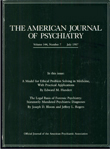Comments on Review of Book on Hysteria
TO THE EDITOR: In her review of my book The Analysis of Hysteria: Understanding Conversion and Dissociation, 2nd ed. (1), Dr. Judith Gold alleges that my opinions are not well supported by references. It is not always clear where she is claiming evidence for this view, but in several instances there are strong indications of misjudgment on her part, if not bias.
Among the examples she gives, one (from p. 110 of my book) referring to hysterical personality characteristics in patients with anorexia nervosa is a conclusion at the end of a detailed discussion of more than a dozen sources that support my comment. Figures from two of those sources are cited. She says that many comments are subjective, and she offers as a typical example my discussion of the DSM-IV criteria for dissociative identity disorder where I say, “Thus, it is possible for a personality to take partial control, or for two or more personalities to share this control, according to this definition. How this can happen while memory is lost may puzzle the thoughtful” (p. 272). She slightly misquotes my original comment, but how indeed can two personalities share this control and have amnesia for each other at the same time? Apparently, Dr. Gold is not willing to consider my question.
Dr. Gold similarly objects to my comment on Putnam when I said that “there is a likelihood that the therapist will produce the phenomenon.” I quoted Putnam at length, showing how he interviews patients in order to elicit multiple personality disorder. Dr. Gold says, “The data supporting.[my] statement are absent.” As with the previous example, I was quoting a text and commenting directly upon it. The segment of citation and critique was complete in itself in each of these cases, and Dr. Gold's statements misrepresent the nature of my remarks.
These examples are joined to a claim that my chapters touching on suggestion lack references. It is difficult in the space of a letter to demonstrate the carelessness with the facts that this statement evinces. More than 20 references deal variously with the effects of placebos, data concerning suggestibility and suggestion, and the conclusions on suggestion of such authors as William James, Freud, Ernest Jones, Baudouin, T.X. Barber, Hilgard, and Ellenberger, as well as the results of physiological studies. The chapter on epidemic or communicable hysteria to which Dr. Gold refers is replete with references.
All of the nine reviews of the first edition of this book that I have seen were highly positive. The difference in the second edition is that I have had the temerity to assess critically the recovered memory movement and multiple personality disorder.
1. Gold JH: Book review, Merskey H (ed): The Analysis of Hysteria: Understanding Conversion and Dissociation, 2nd ed. Am J Psychiatry 1997; 154:284Google Scholar



